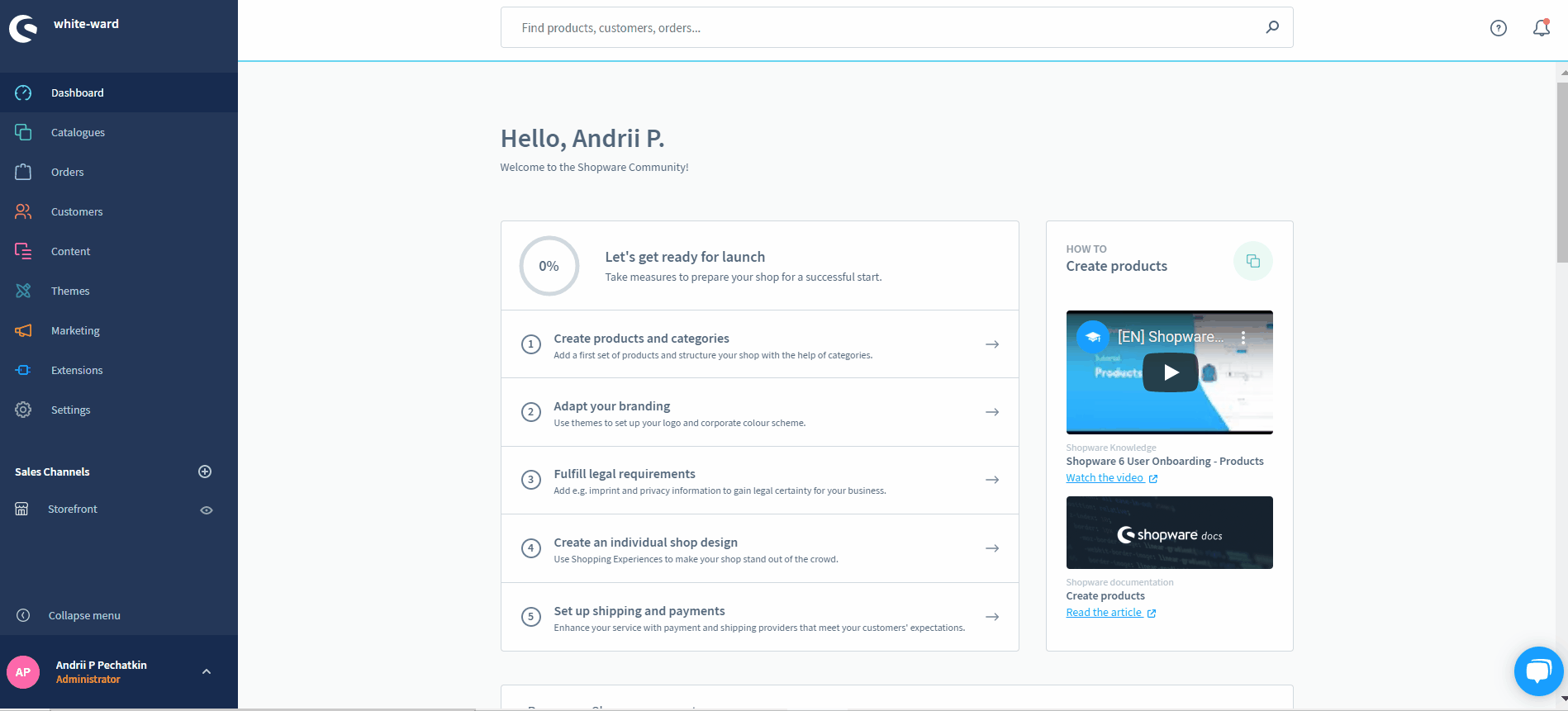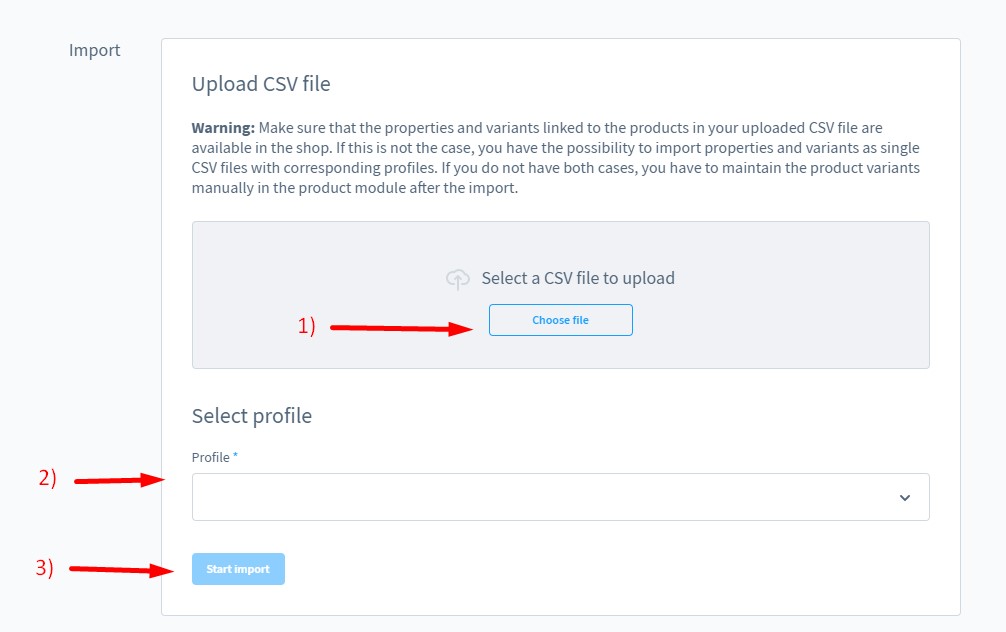Firebear Improved Import, Export & Mass Actions for Shopware 6
 Below, we’d like to introduce you to our Shopware import plugin. Meet the Improved Import, Export & Mass Actions for Shopware 6. It is one of the ecosystem’s most fully featured and powerful data transfer solutions that offers lots of enhancements to the default import and export processes. Our Shopware import export plugin provides a straightforward way to connect your e-commerce website with different external platforms within and around the ecosystem, automating various routine processes. It introduces numerous integrations with other e-commerce platforms, tools, and service providers, including ERPs, CRMs, accounting, etc.
Below, we’d like to introduce you to our Shopware import plugin. Meet the Improved Import, Export & Mass Actions for Shopware 6. It is one of the ecosystem’s most fully featured and powerful data transfer solutions that offers lots of enhancements to the default import and export processes. Our Shopware import export plugin provides a straightforward way to connect your e-commerce website with different external platforms within and around the ecosystem, automating various routine processes. It introduces numerous integrations with other e-commerce platforms, tools, and service providers, including ERPs, CRMs, accounting, etc.
In the article below, we briefly describe the plugin’s key features. We explore import and export jobs, data transfer automation, mapping, and extended connectivity options of our Shopware 6 import & export plugin. After that, you will find a small description of the existing import & export solutions available in the Shopware marketplace along with the default data transfer capabilities of the platform.
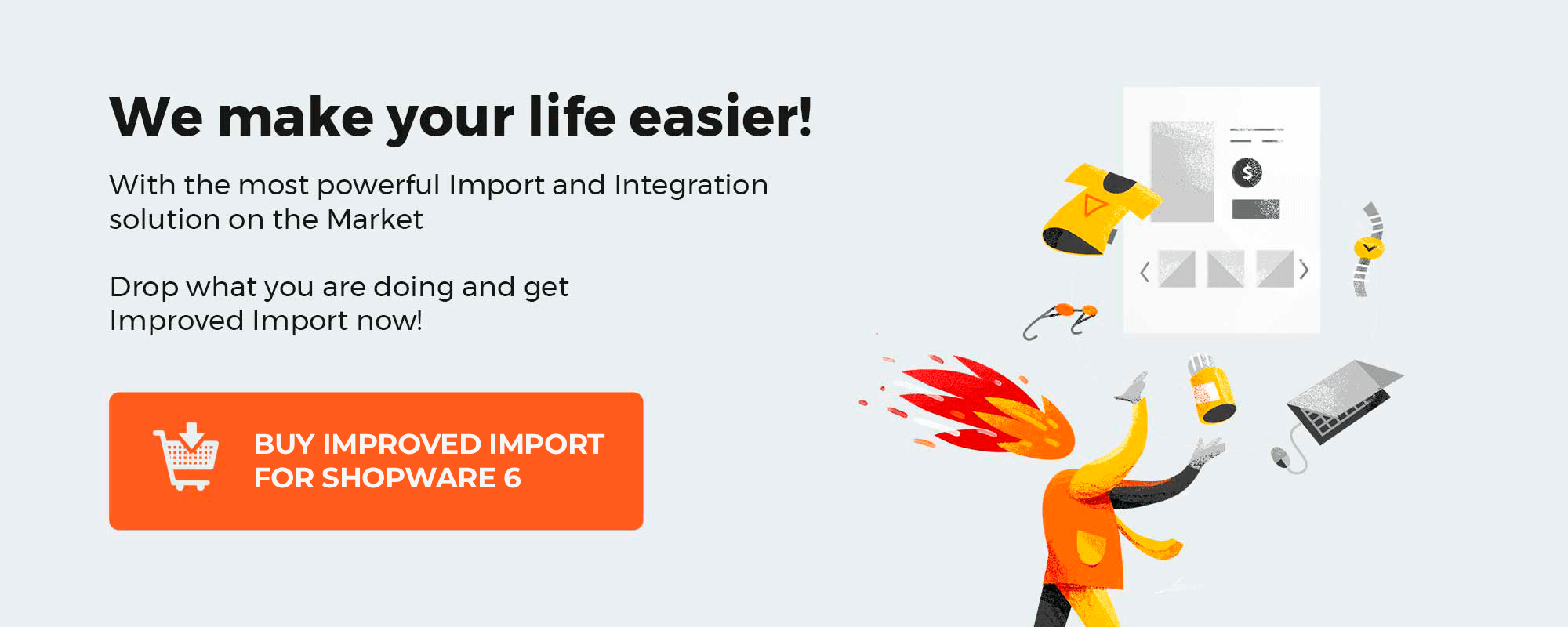
Table of contents
- 1 The Leading Shopware Import Plugin
- 2 Native Shopware Import Plugin
- 3 Existing Import & Export Plugins for Shopware
- 4 Final Words
- 5 Shopware 6 Import Plugin FAQ
- 5.1 What is the Improved Import app for Shopware 6?
- 5.2 Which entities does the Improved Import & Export app support?
- 5.3 Which data sources does this Shopware 6 Import plugin support?
- 5.4 Which file types does Improved Import & Export for Shopware 6 support?
- 5.5 How does the Shopware 6 Import Export plugin work?
The Leading Shopware Import Plugin
As a Shopware merchant, you will experience a dramatic improvement in your daily duties related to data transfers with the Improved Import & Export plugin. Our tool provides numerous features to achieve this goal. The following section lists the key features developed to make Shopware 6 import and export processes as admin-friendly and straightforward as possible.
Import & Export Jobs
Import and export jobs of the Improved Import & Export Shopware plugin are your main tools in the data transfer routine. The application lets you create a job per entity. However, you can simultaneously create and use multiple jobs for the same entity. This enhancement lets you export the same data to different partners or platforms.
The same situation takes place when it comes to import jobs. The Improved Import & Export Shopware plugin lets you set up each job individually, creating unique conditions for every integration. Just hit the “New Profile” button to start the configuration.

Data Transfer Automation
The Improved Import & Export app for Shopware eliminates the necessity to transfer data manually. Instead, our Shopware import plugin introduces the ability to create a schedule of updates that launches import or export processes automatically. You can design a schedule of updates as follows: Turn on the toggle(1), choose your time zone(2), specify the schedule’s starting frequency(3), and configure additional parameters(4), such as the exact time.

As for even-based updates that incorporate rules, conditions, and triggers, they are a part of our Magento solution. If you want to have something similar in the Shopware import export plugin, contact us.
The idea behind this feature is quite straightforward: you choose an activity that triggers an import or export process. Besides, it is possible to specify conditions and create rules to make transfers as precise as you need.
Let’s assume that the app considers customer registration a trigger. When a new client creates an account on your website, the plugin transfers all the provided data to a linked CRM system.
Data Mapping for Shopware 6 Import/Export
Various data mapping features are another notable improvement to the default import and export mechanisms of Shopware. While the platform lets you freely export data and then reimport it back, you cannot act the same with data from other systems. The problem refers to different data storing standards.
Since different platforms have unique rules for maintaining information, you cannot integrate them seamlessly. It is necessary to modify an external data file before transferring it to your e-commerce store, which is a painstaking and time-consuming routine. However, you can streamline the Improved Import, Export & Mass Actions for Shopware 6 to simplify it dramatically. The application offers all the instruments necessary to make every data transfer seamless: use presets to map attributes automatically.
Mapping Presets
The Improved Import & Export plugin for Shopware eliminates the necessity to edit data files manually. The tool offers presets for mapping attributes automatically. It is only necessary to choose a preset suitable for your integration. After that, the application analyzes the input file, discovers unsupported values, and replaces them with the ones used on the platform.
You also get a similar mechanism while exporting data. Our Shopware import export plugin lets you create a data file suitable for an import process to a chosen external platform. Like in the case of import, you have to apply a preset that modifies a data output according to third-party requirements.
Matching Interface
In addition to presets, the Improved Import & Export application for Shopware offers an interface for import and export jobs, where you can match attributes manually. For import, the tool works as follows: you specify external attributes of your data file and set the relevant replacements suitable for Shopware. A similar logic can be applied to export processes. Manual attribute matching has never been so easy.
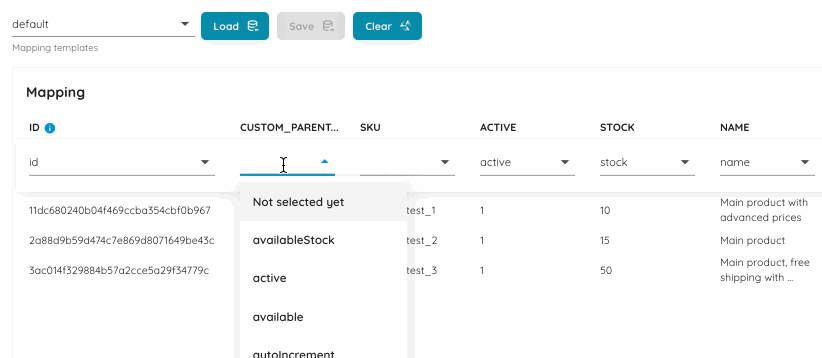
Default Values
In addition to attributes, you can also work with their values. There is a corresponding section in every export profile that lets you specify default values used when no other values are specified.
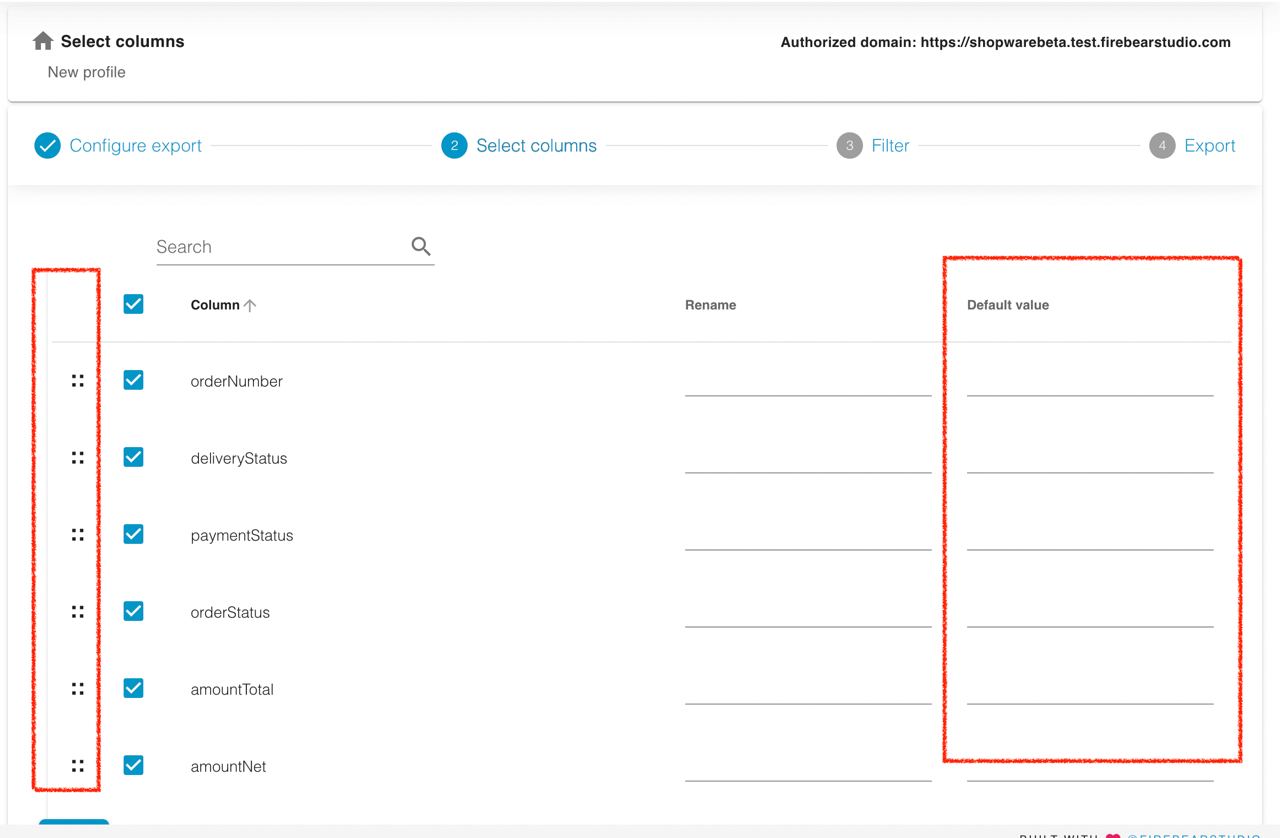
The same section lets you rearrange the order of columns in the exported file.
Filters
When it comes to export processes, the Improved Import, Export & Mass Actions plugin provides another handy feature – filters. You can specify what exact products, customers, or orders to transfer, following the attribute-specific conditions. With filters, you can provide partners or external systems with a precisely tailored output.

Extended Connectivity Options
Another aspect of our Shopware import export plugin is that it extends the platform’s connectivity options. Improved Import, Export & Mass Actions offers the ability to move data in different formats to/from numerous destinations. The app currently supports CSV, XML, and XLSX file formats along with direct Google Sheets transfers. You can rely on file uploads, FTP transfers, URL uploads, and Google Drive integration.
Below, you can see a profile that incorporates a product import via an XML file from a URL.
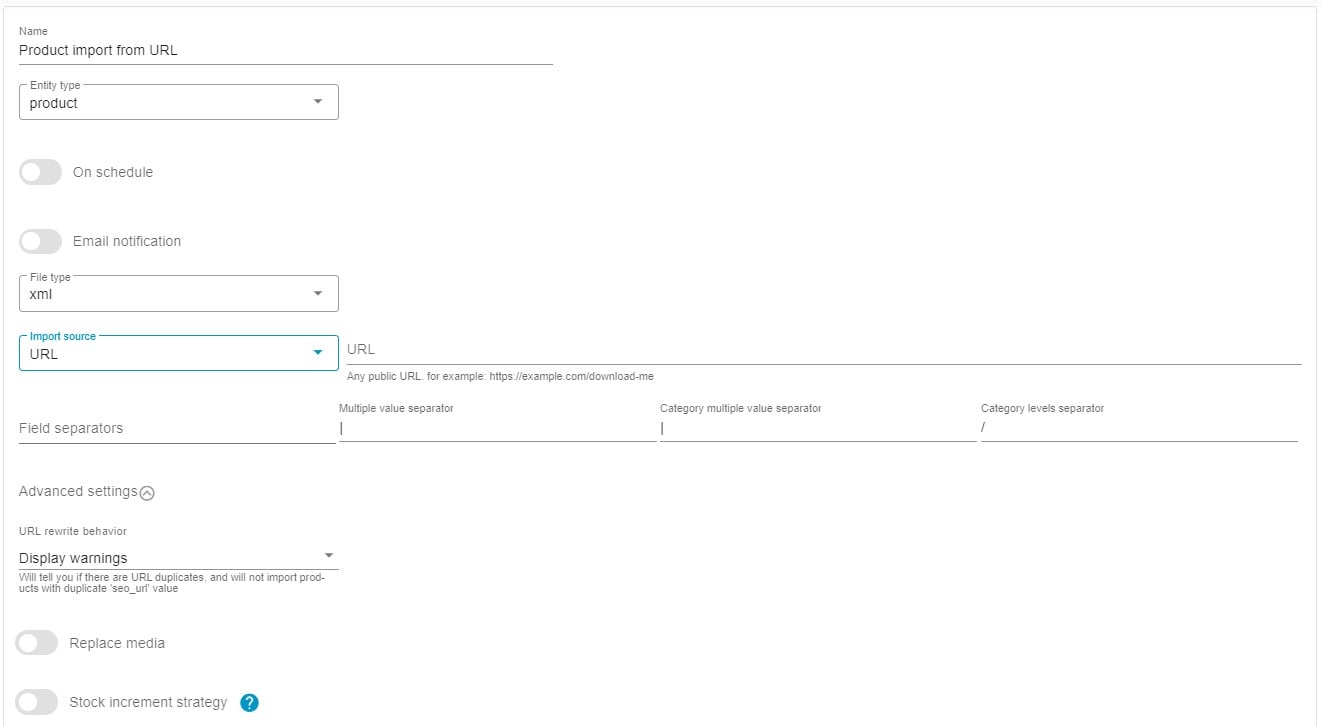
Now, let’s describe the Shopware platform and proceed to its import and export features. Don’t forget that you can contact us to receive more information about our Shopware import plugin. Also, check the Improved Import, Export & Mass Actions User Manual.
Native Shopware Import Plugin
The latest version of the platform – Shopware 6 – is suitable for every business model, whether it is B2C or B2B. This e-commerce solution offers high performance and scalability, provides cloud or on-premise options, and supports the most diverse sales channels and sophisticated frontends. Shopware adds extended flexibility while reducing complexity. Admins, merchants, and customers are at the heart of every development effort taking place on the platform.
The system offers an intuitive and admin-friendly interface, where you can manage all the backend processes at the click of a button, including imports and exports. The corresponding functionality of Shopware 6 is always at your disposal. You can find the basic Shopware 6 import/export module in your administration under Settings -> Shop -> Import/Export.
the basic import procedure in Shopware 6 is quite straightforward:
- Upload a CSV file;
- Select an import profile;
- Launch the process.
Unlike Improved Import, Export & Mass Actions, this tool works with only one file format – CSV – and manual uploads. You cannot automate data transfers, and mapping is way more limited than in our Shopware import export plugin. You won’t find filters or data previews in the default Shopware 6 import/export app, not to mention email notifications or other features that can help you modify data automatically, choosing different update strategies.
For further information on the default Shopware import/export, follow our Ultimate Guide To Shopware 6 Import and Ultimate Guide To Shopware 6 Export. Go to the Improved Import, Export & Mass Actions User Manual to discover more benefits of our plugin.
Existing Import & Export Plugins for Shopware
The following chapter is dedicated to other third-party Shopware import export plugins. Let’s begin with the built-in data transfer mechanism. .
Import / Export for Energy Saving Ordinance by gb media
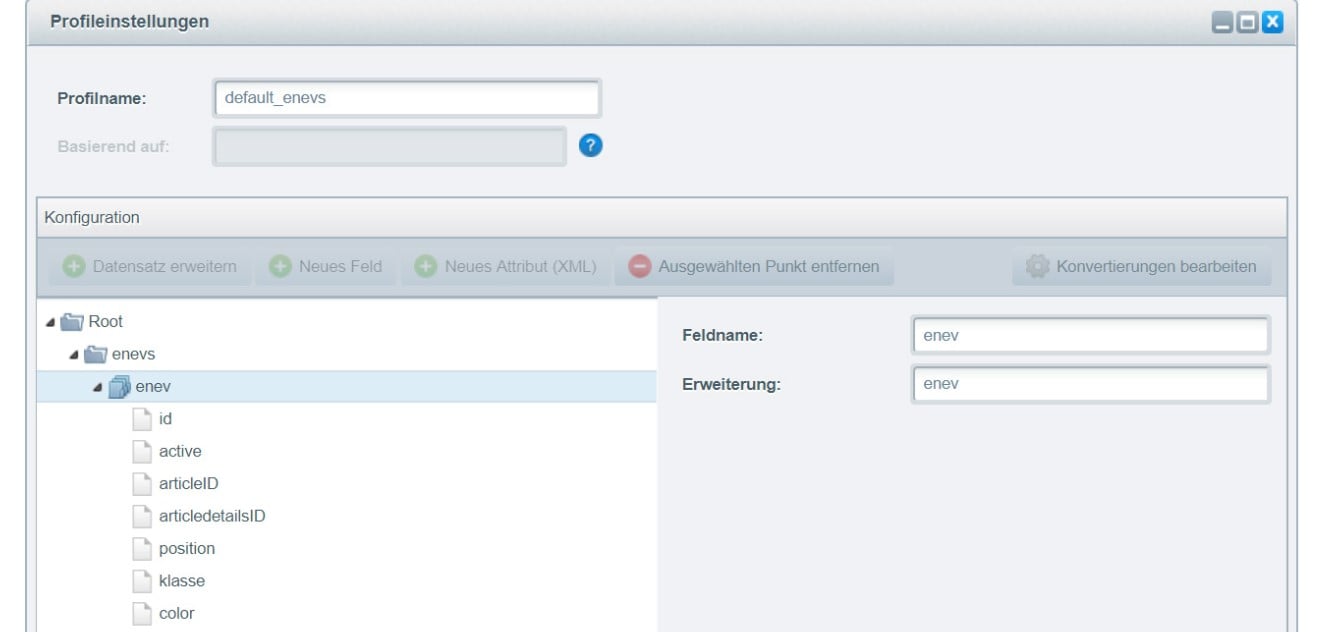
This Shopware import plugin illustrates an example of how to extend the functionality of the default Shopware import/export module. The tool adds one more profile to the standard system’s functionality. As a result, you can set up and import or export files on your own. Note that the tool works only on top of the Label for Energy Saving Ordinance (EnEV) module. The price of the app is €49.00. You can get it here:
eBay Order Import Connector by coolbax
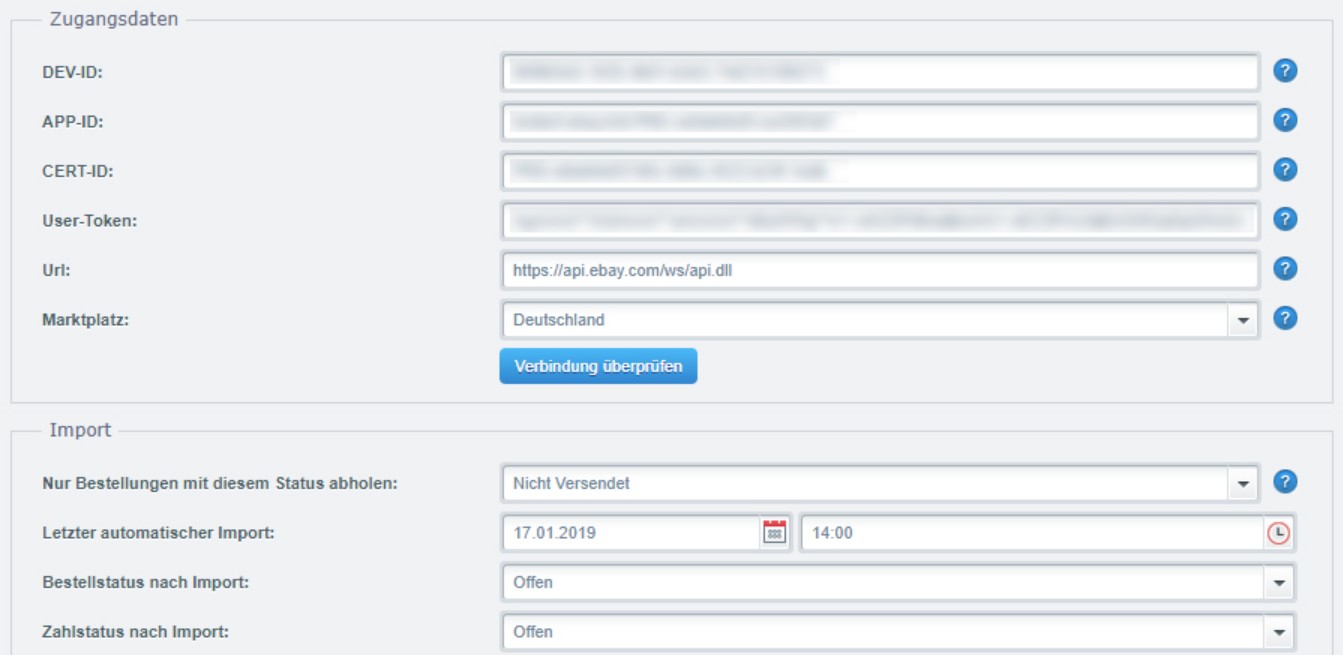
eBay Order Import Connector by coolbax is among the solutions that enable Shopware integrations with external platforms. The Shopware import plugin (it also works on top of another third-party solution) enables the Shopware eBay integration by providing the following features:
- It lets you automate order and customer import from eBay into your e-commerce store;
- The plugin updates stocks on your website;
- It also updates order statuses on eBay when you ship them on the website;
- Automated tracking code transfer is also on board;
- When you ship orders, the extension provides automatic feedback;
- Also, note that it is possible to evaluate orders transferred by the plugin via the Shopware stats;
- The ability of country-specific configurations for shipping methods and service providers is also among the key perks of the extension.
The module costs €95. For further information, follow the link below:
Universal Importer and Exporter by antony Systemhaus GmbH
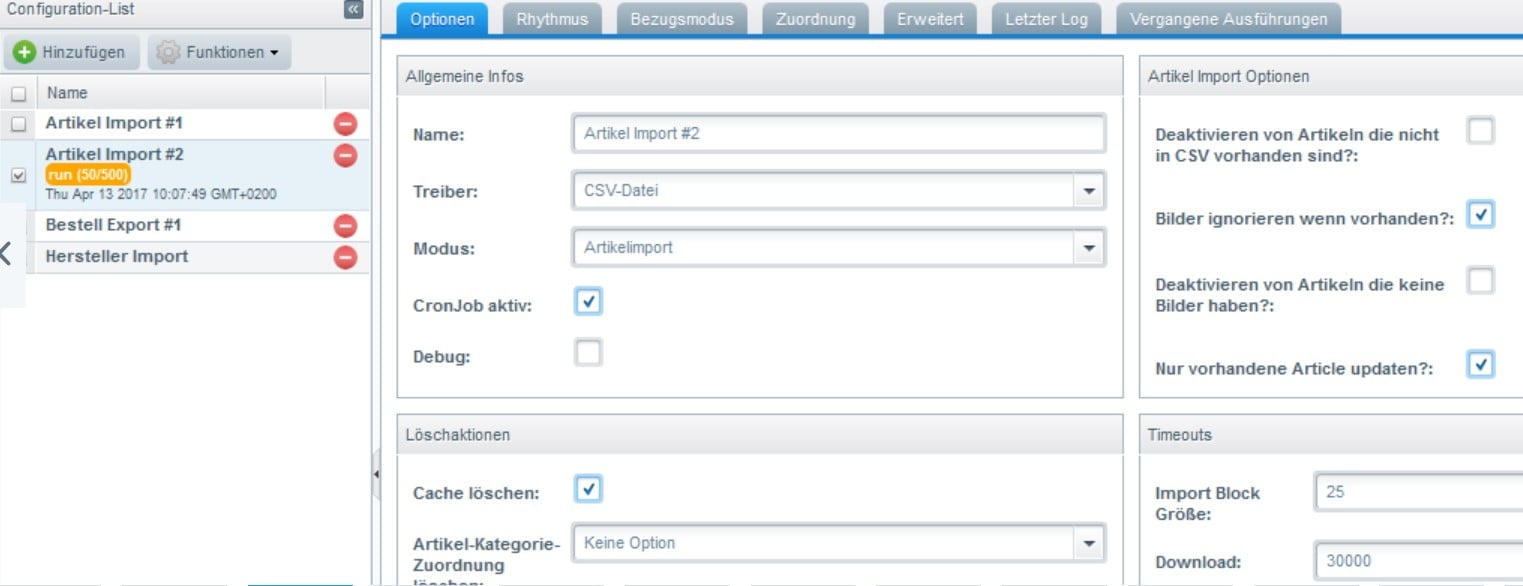
This Shopware import plugin is an example of a stand-alone import/export tool for Shopware. It enables you to import and export a broader range of data in comparison to the default solution. The extension provides the ability to transfer customers, articles, and orders to the system to/from FTP or a file system. Automated import and export processes incorporate the Shopware cron. You can also launch data transfers via CLI.
The tool works with CSV and text files with fixed-length columns. XML files are supported for importing article data via a mapping software solution developed to simplify an XML2CSV conversion. The plugin also provides the ability to map columns and execute PHP scripts per column, data line, and completed job.
However, the configuration of a CSV import is technically sophisticated. It requires Shopware database knowledge or PHP skills.
As you can see, Universal Importer and Exporter by antony Systemhaus GmbH is a more robust solution than the default data transfer tool. However, it is very complicated and still lacks the features our plugin provides. The price of the module is € 495. You can find more details here:
magnalister
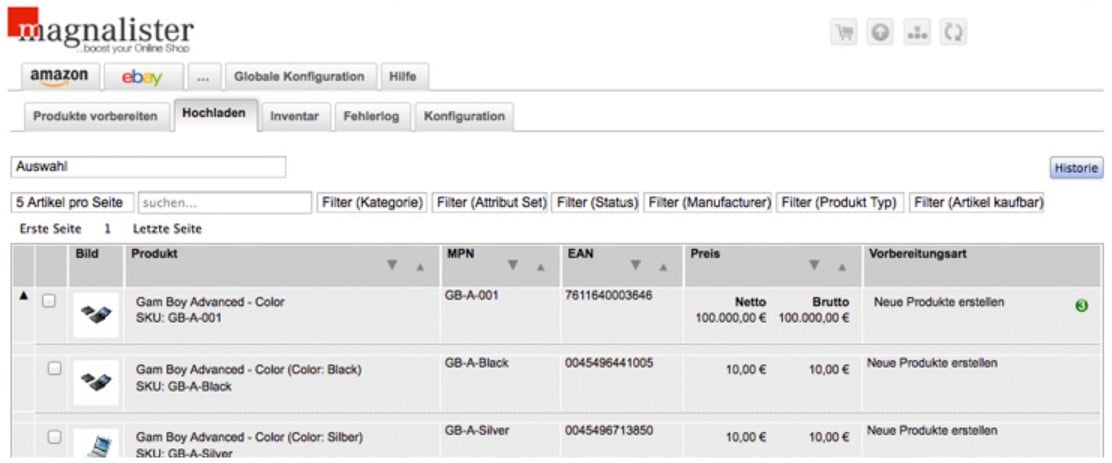
As for this Shopware import plugin, it opens broad opportunities for Shopware integrations with various external platforms. The application offers an interface where you connect your e-commerce store with eBay, Amazon, and other marketplaces and platforms. It lets you upload items from Shopware to any marketplace and import orders back. As for inventory and prices, magnalister synchronizes them automatically. Besides, the plugin sends order statuses to marketplaces. It lets you use various currencies, different price groups, and numerous other features. However, the tool connects Shopware to Marketplaces only, while our plugin provides the ability to transfer data between your e-commerce website and any external systems, including ERP, CRM, and accounting platforms.
It is possible to use the connector for free for 30 days. Next, its price is €29 per month. For further information, follow this link:
Final Words
As you can see, the Shopware platform does not provide any import and export extension that can compete with our Shopware import plugin. We offer a potent data transfer solution that covers various common import and export needs. Our developers deliver a powerful and feature-rich import and export plugin for Shopware 6 that can fix all the weak places of the native Shopware 6 import/export tools and their third-party rivals, satisfying extensive merchants’ demands.
Our Shopware import plugin brings the following benefits to the ecosystem:
- The ability to use multiple file formats and sources;
- Advanced usability when all import and export processes are available in the same place;
- Import of files of big sizes;
- Support for Google Sheets import and export;
- Mapping: manually or with presets;
- Schedules to automate data transfers, etc.
Follow the link below and contact us to learn more about the Improved Import, Export & Mass Actions plugin:
Shopware 6 Import Plugin FAQ
What is the Improved Import app for Shopware 6?
The Improved Import, Export & Mass Actions app for Shopware 6 is a tool that allows you to import, export, and manage data inside your Shopware 6 installation more efficiently. At the same time, it lets you connect your e-commerce website with CRM, ERP, and other external systems or perform data migrations from the existing e-commerce websites.
Which entities does the Improved Import & Export app support?
The tool supports all the core entities that you usually use daily working in your Shopware 6 administration: products, orders, and customers. More entities may be added upon request.
Which data sources does this Shopware 6 Import plugin support?
The plugin lets you transfer data between your e-commerce website and external systems via direct file upload, FTP/SFTP, Google Sheets, Google Drive, and direct URL uploads.
Which file types does Improved Import & Export for Shopware 6 support?
With the help of our tool, you can move data via CSV, XML, and XLSX.
How does the Shopware 6 Import Export plugin work?
The app imports and exports data directly between your Shopware 6 database and the external system. You can rely on cron to automate these processes. Also, data mapping is at your disposal when you need to import custom formats or create unusual output formats.


